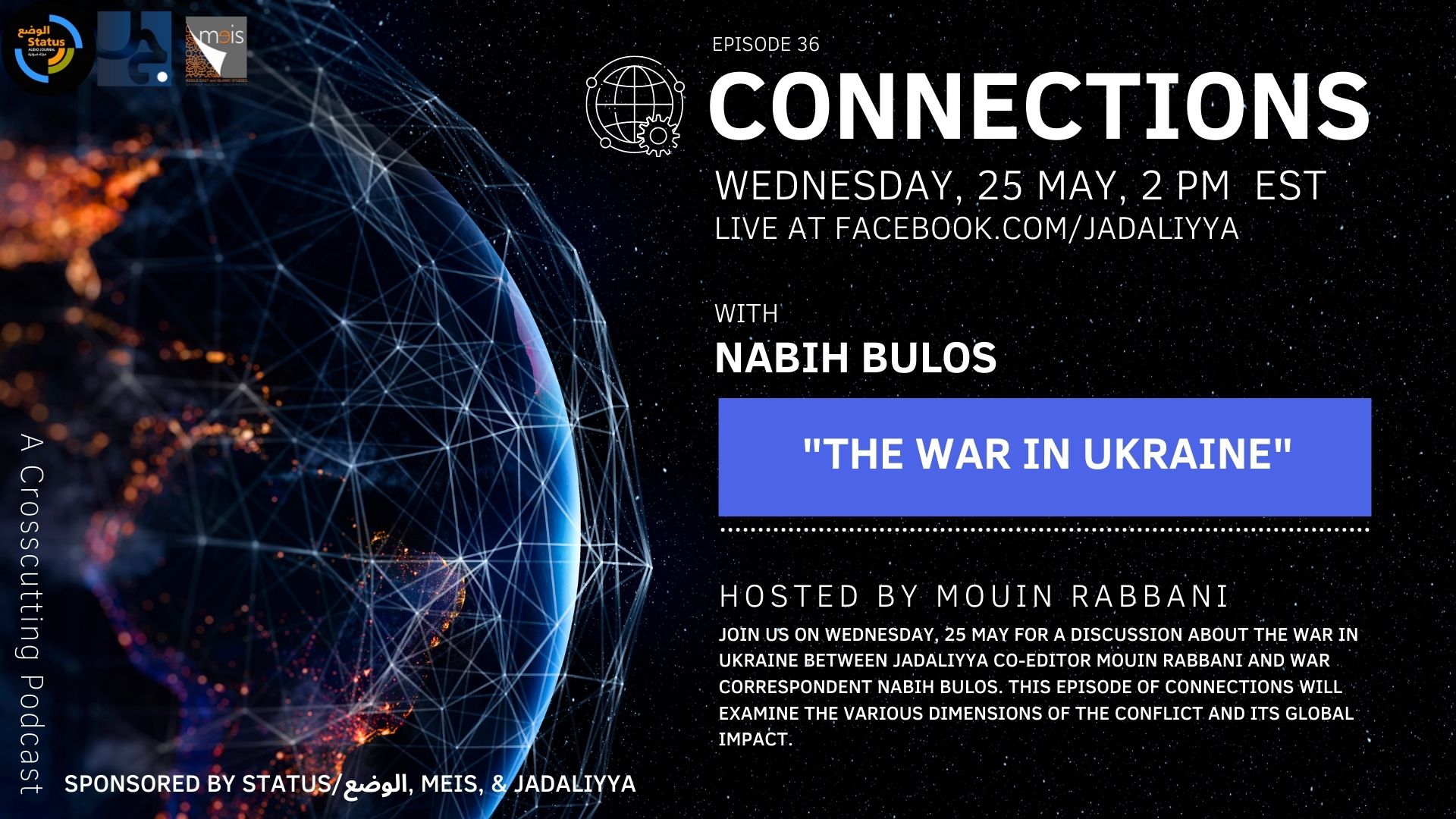Connections Episode 36
The War in Ukraine
Mouin Rabbani interview Nabih Bulos
Wednesday, 25 May 2022
2:00 PM EST | 20:00 CET | 21:00 Kiev

Join us on Wednesday, 25 May for a discussion about the war in Ukraine between Jadaliyya Co-Editor Mouin Rabbani and war correspondent Nabih Bulos. This episode of Connections will examine the various dimensions of the conflict and its global impact.
Connections offers timely and informative interviews on current events and broader policy questions, as well as themes relevant to knowledge production. It combines journalism, analysis, and scholarship.
Guest
Nabih Bulos, who was in Ukraine at the beginning of the Russian invasion and has reported extensively from that country since then, is the Middle East bureau chief of the Los Angeles Times. Since 2012 he has covered war, revolution, and upheaval throughout the region, including the expansion of the Islamic State movement and the campaign to defeat it. His work has taken him to Syria, Iraq, Libya, Yemen, Afghanistan, and elsewhere in the region, as well as on the migrant trail through the Balkans and Europe. A Fulbright scholar, Bulos is also a concert violinist who has performed with Daniel Barenboim, Valery Gergiev, and Bono.
Host
Mouin Rabbani has published and commented widely on Palestinian affairs, the Israeli-Palestinian conflict, and the contemporary Middle East. He was previously Senior Analyst Middle East and Special Advisor on Israel-Palestine with the International Crisis Group, and head of political affairs with the Office of the United Nations Special Envoy for Syria. He is Co-Editor of Jadaliyya Ezine.
Previous Episodes
Connections Podcast Episode 1: The Biden Administration and the Middle East with Noam Chomsky
Connections Podcast Episode 2: The Politics of Holy Cities with Mick Dumper and Maha Samman
Connections Podcast Episode 3: Apartheid Israel with Norman Finkelstein
Connections Podcast Episode 4: Israel-Palestine: A Turning Point? with Nathan Thrall
Connections Podcast Episode 5: Investigating Israel with Lori Allen
Connections Podcast Episode 6: The US Congress, Israel, and the Palestinians with Lara Friedman
Connections Podcast Episode 7: Palestine at the Crossroads with Hanan Ashrawi
Connections Podcast Episode 9: Lebanon in Crisis with Nadya Sbaiti
Connections Episode 10: Crisis in Tunisia with Houda Mzioudet
Connections Episode 11: A Planet in the Balance with Jeffrey D. Sachs
Connections Episode 12: Focus Afghanistan with Benon Sevan
Connections Episode 13: Asylum in the USA with Basileus Zeno
Connections Episode 14 - Digital Espionage: A Global Pandemic with Marwa Fatafta
Connections Episode 15: The Lasting Legacies of US Torture with Lisa Hajjar
Connections Episode 16: Whither Yemen? with Helen Lackner
Connections Episode 17: A Decade of Upheaval with Nabih Bulos
Connections Episode 18 — Iran: Domestic and Foreign Politics with Ali Vaez
Connections Episode 22: Narrations of Palestine with Alison Glick and Nora Lester Murad
Connections Episode 23: The Global Far Right with Cas Mudde
Connections Episode 24: Crises in The Maghreb with Samia Errazzouki
Connections Episode 25: War Economies with Mark Taylor
Connections Episode 26: Libya in the Balance with Claudia Gazzini
Connections Episode 27: Israel's Sacred Terrorism with Remi Brulin
Connections Episode 28: Tunisia's New Autocracy with Mohammed Haddad
Connections Episode 29: Crisis in Afghanistan with Ali Latifi
Connections Episode 30: Yemen’s Endless War with Safa Al Ahmad
Connections Episode 31: Sudan Today with Khalid Mustafa Medani
Connections Episode 32: Protecting Cultural Heritage with Heghnar Watenpaugh
Connections Episode 33: The Struggle for Human Rights in the Middle East with Sarah Leah Whitson
Connections Episode 34: Palestinian Textbooks with Martin Konečný
Connections Episode 35: The Libya Intervention Revisited with Ian Martin